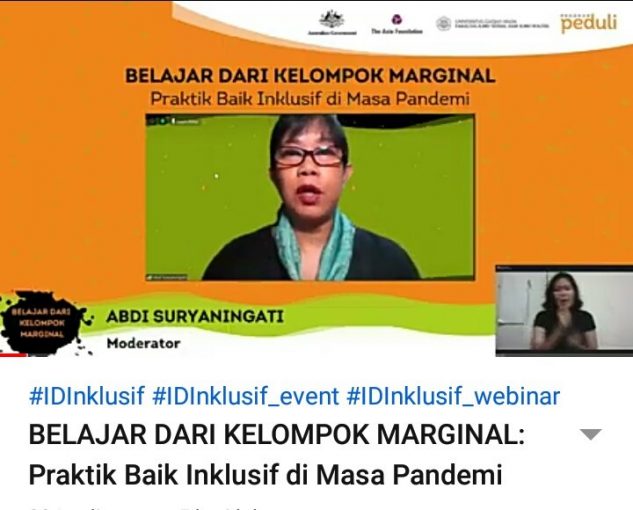
Yogyakarta, August 5th 2020—The Asia Foundation and the Fisipol UGM Care Program held a webinar with the topic of learning from marginal groups and how to be inclusive in the middle of the pandemic. The event is held via zoom and live streamed through Youtube. The discussion started at 10.00 am and had four speakers; Edi Supriyanto, Hasna, Berby Gita, and Cindy Purnama Fitri. Aside from the speakers,there are also three other people to liven up the discussion; Vivi Yulaswati, B. wisnu Widjaja, and Ninil M Jannah. This event was moderated by Abdi Suryaningti, the team leader of the Asia Foundation care program.
Opening the event that morning, Sandra Hamid as The Asia Foundation Country Representative said a prologue to start the discussion. In her speech, Sandra said that the Covid-19 pandemic has changed something that was considered normal to strange. Other than that, the pandemic also affects the society, especially the marginal groups. Sandra also said that marginalization has happened everywhere and it has been caused by a lot of factors. Marginalization has caused a social divide in our society. Therefore, the Care program tries to bridge the divide by getting closer to the community and by prioritizing the needs of everyone.
After that, each speaker told their experience as a part of the marginal group. The first speaker, Has, is a secretary in the Central Sulawesi Matue Sigi Village. She said that as a person that lives in a remote area, she often encounters troubles, one of them being access to health care. Other than that, when natural disasters happen, this area is automatically isolated from other areas so that receiving aid through land is almost impossible. However, knowing those conditions, the Matue Sigi Village still tries to overcome the barriers. They also do this in the middle of the Covid-19 pandemic. A couple things that they already did are building a health care center in one of the villages, managing the distributions, planning, as well as evaluating the aids so that it is distributed wel.
The next speaker, Cindy Purnama Fitri, is a child of a migrant laborer. Cindy is also a part of the Pandan Wangi village kids forum. In that forum, Cindy had a responsibility to handle the problems that rose up in her area. Some of the things that she has done are to distribute information about healthy living in the form of videos and comics, collecting datas, and distributing basic necessities.
Other than that, Cindy also had a role in preventing child marriage. The activity that Cindy did is also similar to what the third speaker, Edi Supriyanto, has done as the leader of the SEHATI group. Specifically, Edi’s activity focuses on how to help the disabled community. Some of the things that he did was to distribute information inclusively, give job training for the disabled community, and coordinate with the task force regarding credible Covid-19 information.
Berby Gita as the last speaker was a representative of Srikandi Pasundan, a community of transgender community in the West Jaba. Srikandi Pasundan was formed because of the problems that transgender people have in fulfilling their basic necessities, such as their health care and education. A couple things that have been done by this community is to increase the living quality of the transgender people and to do advocation towards the government.
In the case of a pandemic, they also participated in the effort to minimize the spread of the pandemic by helping to distribute aid and opening a community kitchen. To close the discussion, Gista told her hope to include trans people in the covid-19 management effort. Through the discussion and the elaboration from each speaker, we know that in reality, marginalized groups who are often forgotten in the decision making process can actually help each other better and more inclusively.
